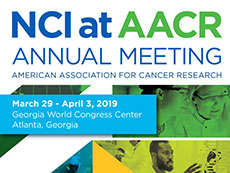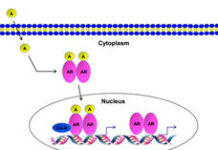March 29, 2019, by NCI Staff

NCI’s collection of cancer information products is constantly growing, so periodically we provide updates on new and updated content of interest to the cancer community.
NCI at AACR 2019
NCI will participate in the American Association for Cancer Research (AACR) Annual Meeting March 29–April 3, 2019, at the Georgia World Congress Center in Atlanta. The NCI at AACR 2019 webpage highlights sessions featuring NCI researchers, activities taking place at the NCI exhibit booth, and the schedule for the NCI/NIH meeting room.
Cancer Trends Progress Report
The 2019 update to the Cancer Trends Progress Report was published in February. The report, developed by NCI’s Division of Cancer Control and Population Sciences (DCCPS), summarizes the nation’s advances against cancer in relation to Healthy People targets set by the Department of Health and Human Services.
NCI Map Stories: Colorectal Cancer in Young Adults
Colorectal cancer incidence and death rates have been dropping overall in the United States since the mid-1980s. However, since the mid-1990s, incidence has been rising among adults younger than age 50. This map story from DCCPS illustrates the changes over the past several decades in incidence and mortality of colorectal cancer in young adults.
MyPART – My Pediatric and Adult Rare Tumor Network
The MyPART network is a group of scientists, patients, family members, advocates, and health care providers who are working together to help find treatments for rare cancers. Sponsored by NCI’s Center for Cancer Research (CCR), the network, which is one of CCR’s Cancer MoonshotSM projects, has a new web portal that explains what cancers MyPART is currently investigating, the project’s rare tumor clinics, and how to participate in a clinical trial or natural history study.
New TCGA Data Portal
The Cancer Genome Atlas (TCGA) program, which ran from 2006 to 2017, molecularly characterized more than 20,000 primary cancer and matched normal samples from 33 cancer types, generating more than 2.5 petabytes of genomic, epigenomic, transcriptomic, and proteomic data. These data, along with historical and programmatic information, are available to anyone in the research community on the new TCGA portal.
Genomics: How DNA Can Inform Cancer Diagnosis and Treatment
On February 14, NCI hosted a Facebook Live event about the expanding role of genomic tests and data in diagnosing and treating cancer. NCI’s Kenneth Aldape, M.D., Megan Frone, M.S., C.G.C., and Lyndsay Harris, M.D., explained the latest research and answered live questions from viewers.
CGH Recognizes World Cancer Day 2019
NCI’s Center for Global Health (CGH) marked World Cancer Day, an initiative of the Union for International Cancer Control, with a post on the CGH Spotlight Blog. The post describes some of the ways CGH works with partners across the globe.
Connect with NCI’s Division of Cancer Biology on Twitter
NCI’s Division of Cancer Biology (DCB) is now on Twitter, with the handle @NCICancerBio. DCB plans to use the new account to reach out to current and potential grantees with new funding opportunities and information about the division, such as resources available to researchers and special programs it supports. @NCICancerBio also shares results of basic cancer research funded by NCI and information about cancer biology for the public.
Words To Know Videos
NCI produces brief videos explaining terms and phrases often used in cancer research and treatment. These Words To Know videos are shared on NCI’s social media platforms, including Twitter, Facebook, and Instagram.
Resources for Researchers
NCI’s Resources for Researchers is a directory of NCI-supported tools and services for cancer researchers. Most resources are free and available to anyone.
DCTD Newsletter, Programs and Initiatives Book
The February issue of NCI’s Division of Cancer Treatment and Diagnosis’ (DCTD) newsletter Pipeline News is now available. This quarterly newsletter provide updates on recent DCTD program activities, initiatives, announcements, funding opportunities, staff highlights, meetings, and publications.
The DCTD Programs and Initiatives Book (2013–2017) provides a comprehensive review of recent research findings and activities across the division.
Spring 2019 DCEG Linkage Newsletter
NCI’s Division of Cancer Epidemiology and Genetics (DCEG) has published the Spring 2019 edition of its DCEG Linkage newsletter. The newsletter features articles of scientific and professional interest for cancer epidemiologists and biomedical researchers worldwide, as well as for graduate students and other early-career scientists.
When Cancer Returns Booklet Revised
Having a cancer recurrence can bring patients many emotions, such as shock, anger, sadness, and fear. The recently revised booklet When Cancer Returns acknowledges those feelings and offers coping tips and information to help those dealing with cancer recurrence get through the cancer experience once again.
Cancer-Causing Substances in the Environment
Various substances found in nature are known to cause cancer, as are certain man-made chemicals. This collection of pages on cancer-causing substances has been updated to reflect the latest information from the National Toxicology Program’s Report on Carcinogens.
HPV and Cancer
Long-lasting infections with high-risk types of human papillomavirus (HPV) are known to cause cancers of the cervix, head and neck, and several other sites. This new page brings together a number of NCI resources related to HPV and cancer and provides information about preventing, screening for, and treating cancers caused by HPV infection.
Screening Tests
Cancer screening tests aim to find cancer early, before it causes symptoms and when it may be easier to treat successfully. This resource from NCI discusses what makes a good cancer screening test and examines several types of tests currently used to screen for specific types of cancer.
HPV and Pap Testing Fact Sheet
The HPV and Pap Testing fact sheet has undergone a complete overhaul to reflect the three testing options (HPV alone, Pap, and HPV/Pap co-testing), how they compare, and the current guidelines from several medical organizations for cervical screening.






